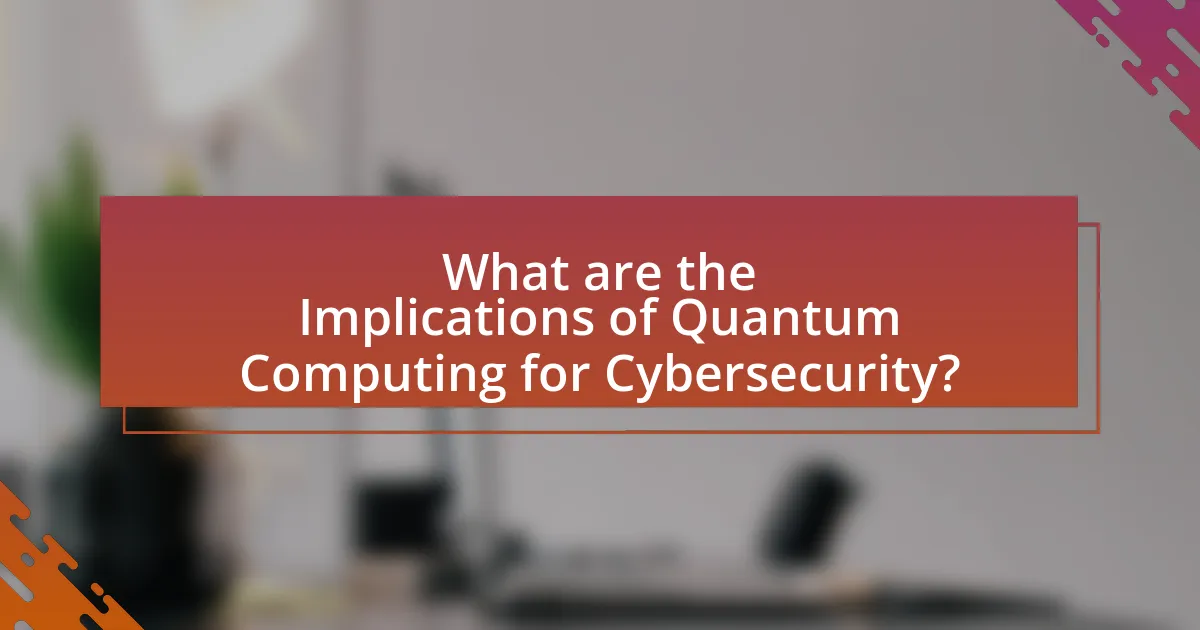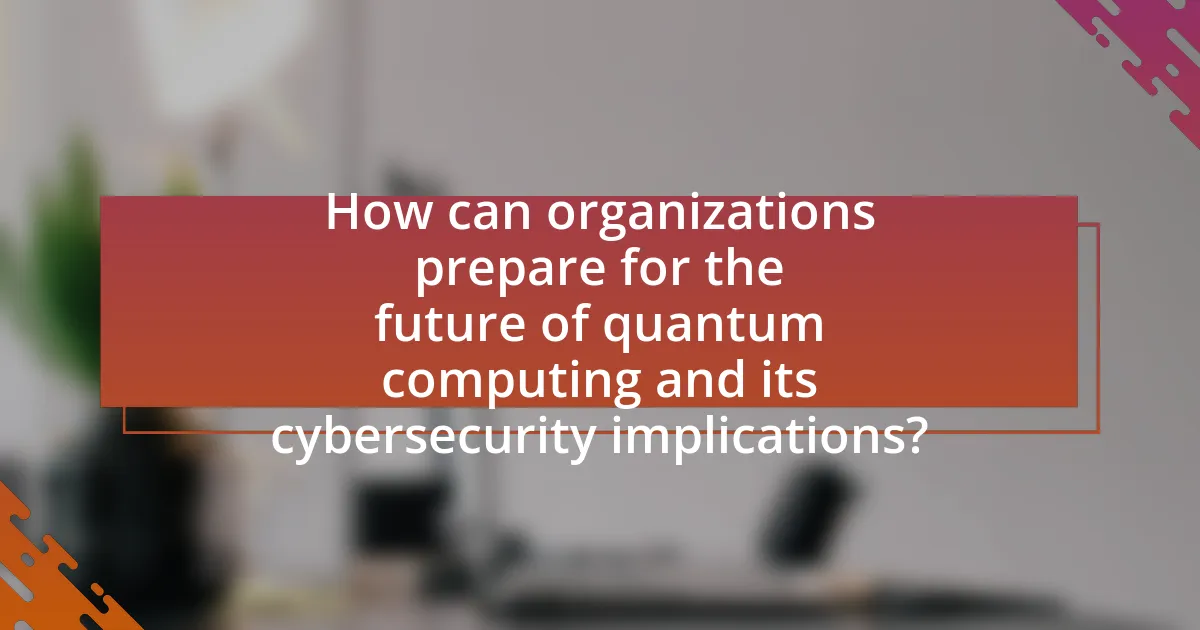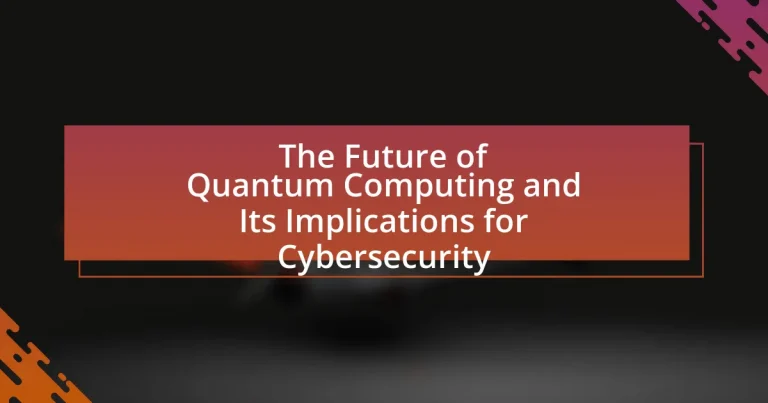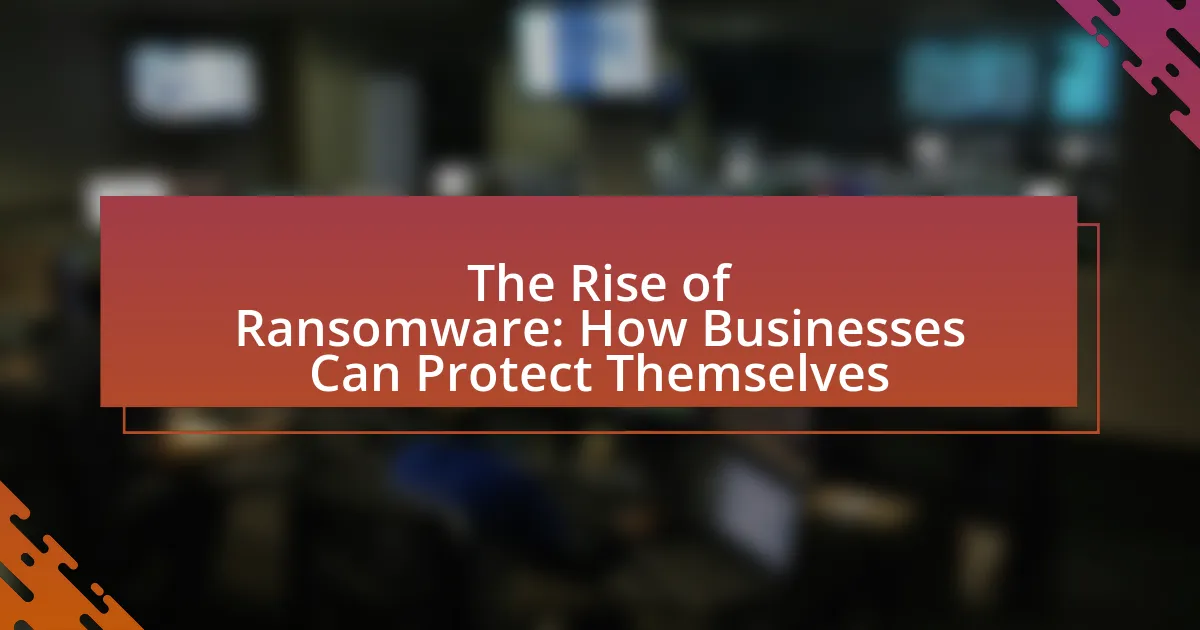The article focuses on the future of quantum computing and its significant implications for cybersecurity. It highlights advancements in quantum technology that will enable quantum computers to solve complex problems beyond the capabilities of classical computers, posing a threat to traditional encryption methods. Key developments include the expected achievement of quantum advantage by 2025, the evolution of quantum algorithms, and the need for quantum-resistant cryptographic standards. The article also discusses potential applications of quantum computing across various industries, the vulnerabilities it exposes in current encryption methods, and strategies organizations can adopt to prepare for the cybersecurity challenges posed by quantum advancements.

What is the Future of Quantum Computing?
The future of quantum computing is poised for significant advancements that will revolutionize various fields, including cybersecurity. As quantum computers become more powerful, they will be capable of solving complex problems that are currently intractable for classical computers, such as factoring large integers and simulating quantum systems. This capability poses a threat to traditional encryption methods, as quantum algorithms like Shor’s algorithm can break widely used cryptographic systems in polynomial time.
Research indicates that by 2025, quantum computers are expected to achieve quantum advantage, where they can outperform classical computers on specific tasks. Companies like IBM and Google are actively developing quantum processors, with IBM’s Quantum System One already operational and accessible for research and development. Furthermore, the National Institute of Standards and Technology (NIST) is working on post-quantum cryptography standards to prepare for the implications of quantum computing on cybersecurity.
These developments underscore the urgency for industries to adapt their security measures in anticipation of the capabilities that quantum computing will bring.
How is quantum computing expected to evolve in the coming years?
Quantum computing is expected to evolve significantly in the coming years, with advancements in qubit coherence, error correction, and scalability. Research indicates that companies like IBM and Google are making strides toward achieving quantum advantage, where quantum computers can solve problems beyond the capabilities of classical computers. For instance, IBM’s roadmap aims to develop a 1,000-qubit processor by 2023, which would enhance computational power and enable more complex simulations. Additionally, the integration of quantum algorithms into practical applications, such as optimization and cryptography, is anticipated to accelerate, driven by increased investment and collaboration in the field. This evolution will likely have profound implications for cybersecurity, as quantum computers could potentially break current encryption methods, necessitating the development of quantum-resistant algorithms.
What technological advancements are driving the future of quantum computing?
Technological advancements driving the future of quantum computing include the development of superconducting qubits, advancements in quantum error correction, and the integration of quantum algorithms with classical computing systems. Superconducting qubits, which are the building blocks of many quantum processors, have seen significant improvements in coherence times and scalability, enabling more complex computations. Quantum error correction techniques are evolving to address the inherent noise in quantum systems, allowing for more reliable operations. Additionally, the hybridization of quantum and classical computing is enhancing computational capabilities, as evidenced by companies like IBM and Google, which are actively working on quantum-classical algorithms to solve real-world problems. These advancements collectively position quantum computing as a transformative technology with profound implications for fields such as cybersecurity, where quantum algorithms can potentially break traditional encryption methods.
How will quantum computing differ from classical computing?
Quantum computing will differ from classical computing primarily in its use of quantum bits, or qubits, which can exist in multiple states simultaneously due to superposition. This allows quantum computers to perform complex calculations at exponentially faster rates than classical computers, which rely on binary bits that are either 0 or 1. For instance, while a classical computer might take years to factor large numbers, a quantum computer could achieve this in a matter of seconds, as demonstrated by Shor’s algorithm. This fundamental difference in processing capability has significant implications for fields such as cybersecurity, where quantum computers could potentially break widely used encryption methods that classical computers cannot efficiently solve.
What are the potential applications of quantum computing?
Quantum computing has potential applications in various fields, including cryptography, optimization, drug discovery, and materials science. In cryptography, quantum computers can break traditional encryption methods, prompting the development of quantum-resistant algorithms. For optimization, quantum algorithms can solve complex problems more efficiently than classical computers, benefiting industries like logistics and finance. In drug discovery, quantum computing can simulate molecular interactions at unprecedented speeds, accelerating the development of new medications. Additionally, in materials science, quantum computing can help design new materials with specific properties, enhancing technology and manufacturing processes. These applications highlight the transformative impact of quantum computing across multiple sectors.
Which industries are likely to benefit from quantum computing advancements?
The industries likely to benefit from quantum computing advancements include finance, pharmaceuticals, logistics, and cybersecurity. In finance, quantum computing can optimize trading strategies and risk analysis through complex calculations that classical computers struggle to perform efficiently. The pharmaceutical industry stands to gain from accelerated drug discovery processes, as quantum algorithms can simulate molecular interactions at unprecedented speeds. In logistics, quantum computing can enhance supply chain optimization by solving complex routing problems more effectively. Finally, in cybersecurity, quantum computing can revolutionize encryption methods, making data protection more robust against potential threats posed by quantum attacks. These benefits are supported by ongoing research and development in quantum technologies, indicating a transformative impact across these sectors.
How can quantum computing impact scientific research and development?
Quantum computing can significantly enhance scientific research and development by enabling complex simulations and data analysis that classical computers cannot efficiently perform. For instance, quantum computers can solve optimization problems and model molecular interactions at unprecedented speeds, which is crucial in fields like drug discovery and materials science. Research published in “Nature” by Google AI Quantum and collaborators demonstrated that quantum algorithms could outperform classical counterparts in specific tasks, showcasing the potential for breakthroughs in understanding complex systems. This capability allows scientists to explore new hypotheses and accelerate innovation across various disciplines, fundamentally transforming the landscape of research and development.

What are the Implications of Quantum Computing for Cybersecurity?
Quantum computing poses significant implications for cybersecurity by potentially breaking traditional encryption methods. Classical encryption relies on mathematical problems that are computationally infeasible for classical computers to solve, such as factoring large integers. However, quantum computers can utilize algorithms like Shor’s algorithm, which can factor these integers exponentially faster, thereby compromising widely used encryption standards like RSA and ECC.
Research indicates that as quantum technology advances, the security of sensitive data could be at risk, necessitating the development of quantum-resistant cryptographic algorithms. The National Institute of Standards and Technology (NIST) is actively working on post-quantum cryptography standards to address these vulnerabilities, highlighting the urgency of adapting cybersecurity measures in anticipation of quantum capabilities.
How does quantum computing pose a threat to current cybersecurity measures?
Quantum computing poses a threat to current cybersecurity measures by enabling the rapid decryption of data protected by traditional encryption algorithms. Classical encryption methods, such as RSA and ECC, rely on the difficulty of factoring large numbers or solving discrete logarithm problems, which quantum computers can solve efficiently using algorithms like Shor’s algorithm. This capability means that sensitive information, including financial data and personal communications, could be compromised much faster than with classical computing methods. As a result, the advent of quantum computing necessitates the development of quantum-resistant cryptographic algorithms to safeguard data against potential breaches.
What vulnerabilities in encryption methods are exposed by quantum computing?
Quantum computing exposes significant vulnerabilities in encryption methods, particularly those based on integer factorization and discrete logarithms. Algorithms such as RSA and ECC (Elliptic Curve Cryptography) rely on the difficulty of these mathematical problems for their security. Quantum computers, utilizing Shor’s algorithm, can efficiently factor large integers and compute discrete logarithms, rendering these encryption methods insecure against quantum attacks. This vulnerability has been demonstrated through theoretical analysis, indicating that a sufficiently powerful quantum computer could break RSA encryption in polynomial time, which is infeasible for classical computers.
How can quantum computing break traditional cryptographic algorithms?
Quantum computing can break traditional cryptographic algorithms by leveraging quantum algorithms that can solve problems exponentially faster than classical algorithms. For instance, Shor’s algorithm enables quantum computers to factor large integers efficiently, which undermines the security of widely used encryption methods like RSA. Classical computers struggle with this task, taking an impractical amount of time as the size of the integers increases. In contrast, a sufficiently powerful quantum computer could factor these integers in polynomial time, rendering RSA and similar algorithms insecure. This capability poses a significant threat to data security, as it could allow unauthorized access to encrypted information.
What opportunities does quantum computing present for enhancing cybersecurity?
Quantum computing presents significant opportunities for enhancing cybersecurity by enabling the development of advanced encryption methods and improving threat detection capabilities. Quantum key distribution (QKD) allows for secure communication channels that are theoretically immune to eavesdropping, as any attempt to intercept the quantum keys alters their state, alerting the parties involved. Additionally, quantum algorithms can analyze vast amounts of data more efficiently than classical algorithms, enhancing the ability to detect anomalies and potential security breaches in real-time. Research indicates that quantum computing can solve complex problems, such as factoring large integers, which underpins many current encryption methods, thereby prompting the need for post-quantum cryptography to safeguard sensitive information against future quantum attacks.
What are quantum-resistant encryption methods?
Quantum-resistant encryption methods are cryptographic techniques designed to secure data against potential threats posed by quantum computers. These methods utilize mathematical problems that are believed to be difficult for quantum algorithms to solve, such as lattice-based cryptography, hash-based signatures, and multivariate polynomial equations. For instance, lattice-based schemes like NTRU and Learning With Errors (LWE) have been extensively studied and are considered strong candidates for post-quantum cryptography due to their resistance to known quantum attacks, such as Shor’s algorithm, which can efficiently factor large integers and compute discrete logarithms.
How can quantum key distribution improve secure communications?
Quantum key distribution (QKD) improves secure communications by enabling the generation and sharing of cryptographic keys through quantum mechanics, ensuring that any eavesdropping attempts can be detected. QKD utilizes principles such as superposition and entanglement, allowing two parties to create a shared key that is theoretically immune to interception. For instance, if an eavesdropper tries to measure the quantum states used in the key exchange, the act of measurement alters those states, alerting the communicating parties to the presence of the eavesdropper. This capability is supported by experimental implementations, such as the BB84 protocol, which has been demonstrated to provide secure key distribution over distances exceeding 200 kilometers.

How can organizations prepare for the future of quantum computing and its cybersecurity implications?
Organizations can prepare for the future of quantum computing and its cybersecurity implications by adopting quantum-resistant cryptographic algorithms and investing in research and development of quantum technologies. As quantum computers have the potential to break traditional encryption methods, transitioning to post-quantum cryptography is essential for safeguarding sensitive data. The National Institute of Standards and Technology (NIST) is actively working on standardizing quantum-resistant algorithms, which organizations should implement to ensure their systems remain secure against quantum threats. Additionally, organizations should conduct regular risk assessments to identify vulnerabilities in their current cybersecurity frameworks and develop strategies to mitigate these risks in a quantum computing context.
What strategies should organizations adopt to mitigate quantum threats?
Organizations should adopt a multi-faceted approach to mitigate quantum threats, focusing on transitioning to quantum-resistant cryptographic algorithms. This strategy involves implementing post-quantum cryptography standards, which are designed to secure data against potential quantum computing attacks that could break traditional encryption methods. For instance, the National Institute of Standards and Technology (NIST) has been actively working on standardizing post-quantum cryptographic algorithms, with the aim of providing a robust framework for organizations to follow. Additionally, organizations should conduct regular risk assessments to identify vulnerabilities in their current systems and invest in employee training to enhance awareness of quantum threats. By proactively adopting these strategies, organizations can significantly reduce their risk exposure to emerging quantum computing capabilities.
How can businesses assess their current cybersecurity posture in light of quantum advancements?
Businesses can assess their current cybersecurity posture in light of quantum advancements by conducting a comprehensive risk assessment that includes evaluating their encryption methods against potential quantum threats. This involves identifying vulnerabilities in existing cryptographic systems, as quantum computers have the potential to break widely used encryption algorithms, such as RSA and ECC, through Shor’s algorithm.
To validate this approach, organizations can reference the National Institute of Standards and Technology (NIST) guidelines, which emphasize the importance of transitioning to quantum-resistant algorithms. Additionally, businesses should engage in scenario planning to understand the implications of quantum computing on their data security and invest in training for their cybersecurity teams to stay informed about quantum developments.
What role does employee training play in preparing for quantum cybersecurity challenges?
Employee training is crucial in preparing for quantum cybersecurity challenges as it equips personnel with the necessary knowledge and skills to understand and mitigate risks associated with quantum computing. As quantum technologies evolve, traditional cybersecurity measures may become obsolete, necessitating a workforce that is well-versed in quantum principles and their implications for data security. Research indicates that organizations investing in specialized training programs for their employees can significantly enhance their resilience against quantum threats, as evidenced by a study from the National Institute of Standards and Technology, which emphasizes the importance of workforce education in adapting to emerging technologies.
What best practices can organizations implement for a quantum-ready cybersecurity framework?
Organizations can implement several best practices for a quantum-ready cybersecurity framework, including adopting quantum-resistant cryptographic algorithms, conducting regular risk assessments, and investing in employee training on quantum threats. Quantum-resistant algorithms, such as lattice-based or hash-based cryptography, are designed to withstand attacks from quantum computers, which can break traditional encryption methods. Regular risk assessments help organizations identify vulnerabilities in their systems that could be exploited by quantum technologies. Furthermore, training employees on the implications of quantum computing ensures that the workforce is prepared to recognize and respond to emerging threats. These practices are essential as the National Institute of Standards and Technology (NIST) has been actively working on standardizing post-quantum cryptography to enhance security against future quantum attacks.
How can organizations stay informed about quantum computing developments?
Organizations can stay informed about quantum computing developments by subscribing to industry publications, attending conferences, and engaging with academic research. Industry publications like “Nature Quantum Information” and “Quantum” provide peer-reviewed articles on the latest advancements. Conferences such as the IEEE International Conference on Quantum Computing and Engineering offer networking opportunities and insights from leading experts. Additionally, organizations can follow research from institutions like MIT and IBM, which regularly publish findings on quantum technologies. This multi-faceted approach ensures that organizations remain updated on critical advancements and trends in quantum computing.
What partnerships or collaborations can enhance quantum cybersecurity efforts?
Collaborations between academia, industry, and government can significantly enhance quantum cybersecurity efforts. Academic institutions can contribute cutting-edge research and innovation, while industry partners can provide practical applications and resources for implementation. For instance, partnerships like the Quantum Internet Alliance, which includes universities and tech companies, aim to develop quantum communication technologies that bolster cybersecurity. Additionally, government initiatives, such as the National Quantum Initiative Act in the United States, promote collaboration among various sectors to advance quantum technologies and secure critical infrastructure. These partnerships leverage diverse expertise and resources, driving advancements in quantum cybersecurity.




